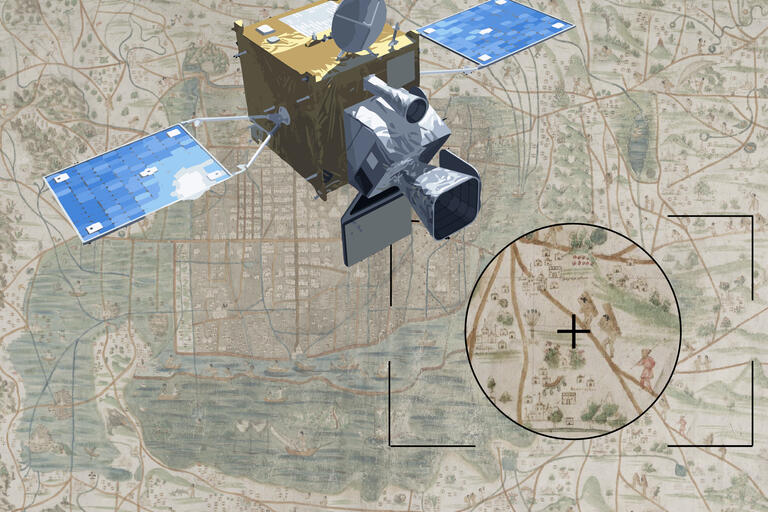Friday, May 31
9:30 - 9:45 AM
Breakfast and check-in
9:45 - 10:00 AM
Alan Karras & Shane Carter - Program Introduction
10:00 AM - 12:30 PM
Information Management and Political Control in Russia
Speaker: Melissa Samarin
Information gathering and surveillance tactics are increasingly being used as political control methods by modern states. This is especially true within 'informational autocracies' like Russia, where information gathering, media control, and propaganda are strategically used to advance state agendas and policies and ensure widespread compliance. Utilizing a theoretical framework of political control, this discussion will focus on the specific informational tactics that the Russian state uses for infiltration, cooptation, and indoctrination, with the aim of maintaining political support and stability amongst the population.
12:30 - 1:30 PM
Lunch
1:30 - 4:00 PM
Citizenship Laws, Biopower, and the Information Apparatus in India
Speaker: Angana P. Chatterji
This presentation examines contemporary laws and policies seeking to alter the basis of Indian citizenship through exclusionary, majoritarian changes to the law. Promulgated by the Hindu nationalist Bharatiya Janata Party (BJP) government, two initiatives that recast the basis of Indian nationality are the Citizenship (Amendment) Act, (CAA), 2019, and the National Register of Citizens (NRC). Nationwide protests have been met with brutal state suppression of dissent. The BJP contends that many Muslims reside in India “illegally,” popularizing revisionist history in the development of a conscious, repressive, always gendered, state apparatus of majoritarian and caste dominance. The citizenship movement has been operationalized by the BJP through three intersecting campaigns: injurious amendments to the law, racialization of Muslims in public discourse, and political signalling to trigger vigilantism. BJP politicians mobilize social discontent and political grievances to obfuscate the porosity of borders between what is “India” in this historical present and surrounding states and regions in South Asia, for reasons of geography, relationships, and intimate histories. The pilot citizenship experiment is focused on the state of Assam in the Northeast, with injurious impact on its sizeable Muslim population. The last update to the NRC, published on August 31, 2019, reportedly excluded 486,000 Bangla Muslims. The burden of proof to verify citizenship status rests on the individual.
The CAA and NRC authorize the collection of highly sensitive information by state agencies, stockpiling information as an instrument of biopower to regulate social life. The information accumulated includes individual demographic and biometric data, utilized for social engineering, prompting fear and isolation. Proof of inhabitance rendered by individuals from target communities is also routinely discredited or deemed inadmissible. Community knowledge holders say that most individuals incriminated as “foreigners” are local inhabitants with documentary evidence of belonging. Yet, numerous individuals have been declared “foreigners,” separated from their families, detained, and some have committed suicide. In February 2024, the BJP announced the nationalization of prejudicial citizenship. The thrust of this movement attests to a flatlining of law and democracy in India, normalizing the extraordinary power of the Narendra Modi-led BJP in militarizing the contention: “Who is Indian?”
Saturday, June 1
9:30 - 10:00 AM
Breakfast and check-in
10:00 AM - 12:30 PM
Eritrea, Infopolitics, and the Power of Digital Media
Speaker: Victoria Bernal
Websites created and sustained by Eritreans in diaspora over the past several decades stand as one of the most significant initiatives undertaken independently of the state. Due to the Eritrean state’s pervasive domination of public life and orchestration of political expression, the online public sphere created by the diaspora has no equivalent of free press or civil society within Eritrea. Diaspora unsettles relations of belonging and citizenship while the internet facilitates political experimentation, making possible the development of new kinds of objects and spaces, and novel forms of political engagement that have no off-line counterpart.
Behind the Great Firewall: Understanding China's Internet Control and Censorship
Speaker: Xiao Qiang
In this short talk, we'll delve into how the state meticulously regulates the production and dissemination of information within its borders, shaping narratives and controlling access to online content. From the Great Firewall to sophisticated censorship mechanisms, we'll uncover the strategies employed by the Chinese government to manage the flow of information and maintain ideological control. Gain a deeper understanding of the complexities surrounding freedom of expression and information in the digital age, and the implications it holds for both China and the global internet landscape.
12:30 - 1:30 PM
Lunch
1:30 - 4:00 PM
SERVIR: Connecting Space to Village
Speaker: Daniel Irwin
SERVIR—Spanish for “to serve” integrates satellite imagery, forecast models, and in-situ data for improved environmental management, disaster preparedness and response, and improved access to weather and climate information. The SERVIR program was created by researchers at NASA’s Marshall Space Flight Center, together with the US Agency for International Development, to extend the benefits of NASA’s Earth science information to international partners (e.g. governments, universities, civil society) in lower- and middle-income countries in Asia, Africa, and Latin America. SERVIR puts previously inaccessible Earth observation data into the hands of decision makers, as the system has been used to address floods, drought, landslides, algal blooms, air quality, forest fires, and more.
Buy To Spy: How Data Purchases Are Being Used To Circumvent the Fourth Amendment, And How We Can Close This Loophole
Speaker: Jake Laperruque
What if police could pay to install a warrantless wiretap on your phone, or raid your house without judicial approval? This type of "buy to spy" conduct might seem unthinkable, but it's what happens every day when law enforcement purchases highly sensitive personal records — that generally requires court approval to obtain — from data brokers. In this discussion we'll examine how police and intelligence agencies exploit the Data Broker Loophole, and privacy advocates' efforts to enact legislation to fix this problem.

